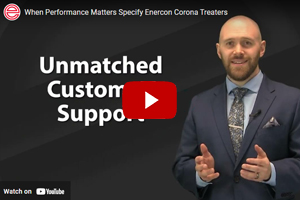Costa Rican converter expands Latin market
- Published: May 01, 1995, By Sacharow, Stanley
Empaques Universal, headquartered in San Jose, Costa Rica, is Central America's largest flex-pack converter with sales of $25 million.
The firm has plants in San Jose and Jinotepe, Nicaragua, and manufactures a wide variety of printed polyethylene film converted into overwraps, garbage bags and various other uses.
Rene Lacayo, the company's president, hosted my visit along with his marketing and sales manager, Hugo Aymerich. The company is situated in the middle of a private park incorporating a tropical nursery for banana plants, a soccer field and a magnificent lake. The plant is about 7,000 sq. m on 10 hectares of land.
The company has a long and interesting history. Lacayo started the company in 1965 in Jinotepe, manufacturing polyethylene film for banana bagging and other uses. In 1979, it was seized by the Sandinista government. Lacayo was given no choice or compensation and left virtually penniless. He left Nicaragua and started up in Costa Rica using borrowed capital. In 1980, Empaques Universal began as a small polyethylene-film-extrusion facility in Alaguela, Costa Rica.
Using his own management know-how and the converting machine experience of Gilberto Gomez, a Nicaraguan colleague who had worked in the Jinotepe plant since 1963, Lacayo integrated flexo printing in 1985. From startup production of 150 tons/month in 1980, production in Costa Rica is now more than 600 tons/month and rapidly growing. The company is privately held by Lacayo with 23 shareholders.
In a stunning upset, Violeta Barrios de Chamorro defeated Ortega and the Sandinistas in the Nicaraguan national elections on Feb. 25, 1990. Dissatisfaction with the economy was seen as the prime factor in the defeat of the Sandinistas. In February 1992, the original Nicaraguan plant, called Plastinic, was returned to Lacayo thus making Empaques Universal the largest producing flex-pack converter in Central America.
Empaques Universal is presently a two-plant operation. In Costa Rica, there are 17 Gloucester Engineering, Alpine and Polystems extruders producing low-density polyethylene, high-density polyethylene and linear low-density polyethylene film with resin supplied by Mobil, Quantum and Exxon. Three Bielloni and Schiavi flexo presses print oriented-polypropylene and polyethylene films. These include two four-color presses, one six-color press and an additional six-color press is scheduled for purchase this year. The company's bagmaking machines were designed by Gilberto Gomez and produce a wide variety of bags for applications as diverse as garbage, bananas, shopping and even mulch.
The bag machines are superbly designed and once, the firm even considered starting up a machine division to market the machines worldwide. Gomez, a 30-year Empaque veteran, told me how the company became involved in designing its machinery. "Because of the specific market requirements in Central America, we initiated machine development internally, particularly in the converting sector--enabling us to manufacture machines designed for our marketplace. By doing so, we became cost-effective and improved our overall machine performance."
There are plans to look at dry-boned lamination and other techniques to increase the firm's overall product mix. They also plan to extend their extrusion mix to include resins such as polypropylene, nylon and ionomers.
The Costa Rican operation presently has more than 350 employees working seven days in three shifts. About 90% of all production is used internally with 25% of sales just for banana film, shrouds and wraps. The remaining 10% is exported to other Central American nations, Puerto Rico and Florida.
Future plans call for increasing the export mix more than 40%. Estimated sales volume in Costa Rica is $15 million/year. By investing in new extrusion, laminating and printing equipment, Lacayo told me he expects the company to grow at least 25% in 1995. Aymerich added, "We're looking and working actively toward globalization of our marketplace, and we can only do this through quality, service and technical innovation."
The recent unexpected gift by the now-democratic government of Nicaragua of Lacayo's original converting plant almost doubled the present site of Empaques Universal. Although it needs updating, the plant was maintained in fairly good shape during the almost 12 years of Sandinista control. A core of dedicated workers even kept the company's cars in superb working order.
There are 15 Alpine, Glouster and Polystems extruders in Nicaragua producing low-density polyethylene, high-density polyethylene and linear low-density polyethylene film. A Brampton Engineering coextrusion line is also in place for low-density polyethylene/linear low-density polyethylene extrusion. Two four-color flexo presses and the planned addition of one six-color press in 1995 complement their overall film production.
The Nicaraguan facility will have new vacuum-forming operation to produce polystyrene food trays and cups There are 18 internally designed bag making machines and 320 employees About 85% of Plastinic production goes to the domestic market with 15% exported to the rest of Central America. An estimated 90% of the needs of the Nicaraguan flex-pack market is served by Plastinic.
A rather unique and rapidly growing part of Empaques Universal's business is its recycling operation.
Despite the lack of national and local legislation in Costa Rica, the company is recycling polyethylene resin at growing rates of more than 150 tons/month in Costa Rica and more than 50 tons/ month in Nicaragua.
In San Jose, there are two extrusion lines for post-consumer polyethylene scrap. The film, mostly banana shrouds, is picked, up by trucks and pelletized for eventual use as nursery bags and/or construction film. Lacayo and Aymerich told me their recycling effort is an important part of the overall program and while not yet profitable, still quite productive.
Lacayo summed up his philosophy by telling me, "We make friends doing business through service, quality and constant innovation. This way we help them solve their own packaging problems so they can be successful in the marketplace."








